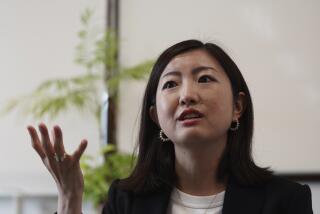Japan’s Trade Zinger: It’ll Export Big-Spending Retirees
- Share via
Tokyo’s powerful Ministry of Trade and Industry is giving serious thought to launching a new Japanese export. It’s not a car, a computer or a video gadget. What the ministry wants to ship to the United States this time is people--specifically, Japan’s mushrooming senior-citizen population.
In the last few weeks the ministry has floated the idea of establishing “silver communities” here for Japanese retirees, billing this as an innovative way to ease America’s trade imbalance with Japan. Japanese seniors would spend a lot of money here, giving the American economy a shot in the arm and helping to dissipate the brewing winds of trade war.
Silver communities abroad, ministry spokesmen say, also would help Japan with its overcrowding problem. As an afterthought, they note that the exported seniors would be happy, too. Armed with Japanese yen, now at record highs against the dollar, they would live like kings.
Can this be serious? Would a country reputed to treat its elders with reverence dump them onto the foreign market like so many cut-rate computer chips?
The trade ministry’s strategists are too shrewd not to understand the patronizing connotations of answering American industry’s demands for greater access to the Japanese market with a proposal to use the United States as a cheap retirement haven.
Reading between the lines, what Tokyo is really saying is that if the United States continues to press for action on the trade deficit, Japan will respond--but Americans may not like the response.
Indeed, there are signs that continued American demands for trade concessions are igniting a dangerous backlash. The government of Prime Minister Yasuhiro Nakasone is under increasing domestic criticism for going too far in accommodating foreign interests. Recently, 18 members of parliament from Nakasone’s own party organized a faction to demand that he cease his “groveling diplomacy” and assert Japan’s rights more forcefully abroad.
Prominent U.S. business and political voices have lately intensified their invective against Japan’s unwillingness to open its markets, disregarding Nakasone’s many concrete measures in that direction. From the Japanese viewpoint, Tokyo has made concession after concession, only to see Japan-bashing intensify in Washington.
The reality is that, aside from Canada, Japan buys more from the United States than any other country does--$30 billion worth. If the Japanese don’t buy enough from us, the problem has much to do with our own failures as exporters.
Among U.S. companies successful in Japan, it has become axiomatic that the real barriers to the market are no longer those created by law, but rather those having to do with local business culture. The way to penetrate the Japan market is to do exactly what the Japanese did in their first forays into the United States in the 1950s--dig in deep with a long-term strategy, study hard, work hard, innovate, adapt, invest heavily, live frugally, send top people, try, fail and try again until you win.
Swaggering a bit now under the weight of their own global economic power, the Japanese seem to be saying to us, “What’s wrong with you? Why can’t you do in our country what we had to do in yours? Why do you demand that our government help you? Oh, well, if you really insist, we’ll give you a bit of charity--we’ll put the old people we can’t use anymore out to pasture in your country, and maybe some of your unemployed auto workers can get jobs looking after them.”
To egocentric Americans born when the United States was the world’s mightiest business machine, the Japanese message is humiliating, and therefore will be ignored. But, painful as it is to accept, there’s truth in it just the same.
If we really want to compete for economic leadership in tomorrow’s world, the time has come to stop believing that we can do it by begging, demanding and cajoling concessions out of Tokyo. Instead, we must beat the Japanese at their own game: We must create the superior goods and services of critical importance to the future world marketplace, and master the art of selling them, not only at home, as has been our traditional bent, but as exporters par excellence in Japan and everywhere else around the globe.
If we don’t, America might just as well become an old-age home for the elderly Japanese whose hard work made their country the export force that it is today.
More to Read
Sign up for Essential California
The most important California stories and recommendations in your inbox every morning.
You may occasionally receive promotional content from the Los Angeles Times.













